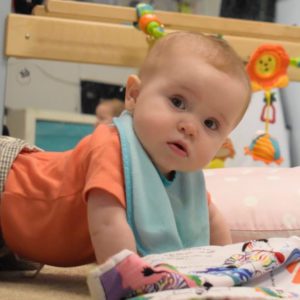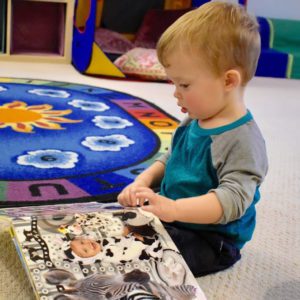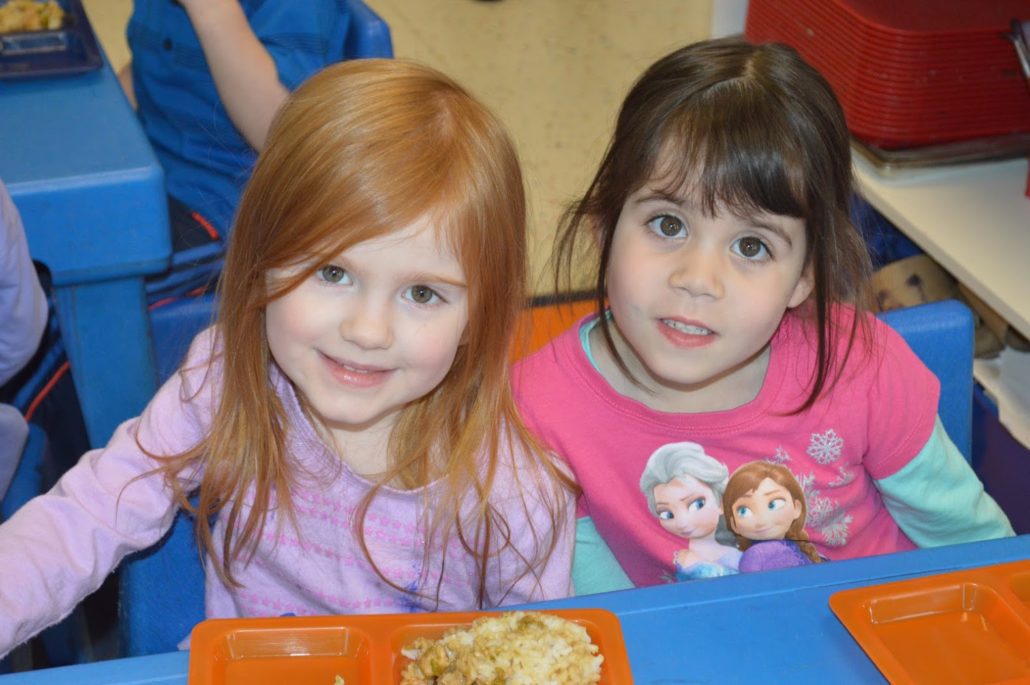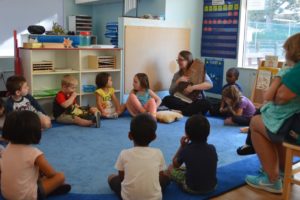Growth for all Stages
We are dedicated to using developmentally appropriate practices in a warm, loving and safe environment. Our play-based curriculum provides for growth in all developmental domains and uses materials, activities, and guidance to enhance children’s cognitive, language, social-emotional, creative, and physical development. We integrate additional key content areas including literacy, mathematics, science, social studies, health and safety and the arts. Children are encouraged to express themselves in a wide variety of ways including music, painting, drama, song, movement, and play. We help children become independent thinkers, problem solvers, and skilled communicators. Our teachers model respectful, effective communication as well as kindness, acceptance, and consideration for others.
It is important to note that the majority of Kindergarten teachers say social-emotional skills (such as the ability to focus on a task, persistence, impulse control, and cooperation with peers) are the most crucial skills for successful kindergarteners.
Our carefully prepared, mixed-age classrooms contain the many materials scientifically developed by Dr. Maria Montessori. The children have the opportunity to work with these materials in the areas of practical life, sensory exploration, language development, mathematical understanding, geography, botany, music and art.
The teacher guides the children’s work, and allows them to move forward at their own pace. The students become self-confident, enthusiastic and joyful learners with remarkable focus and concentration. Our classrooms offer plenty of opportunities for social interaction and children learn to cooperate and respect each other.
The Montessori classroom environment and activities are carefully arranged in the following areas:
PRACTICAL LIFE
Practical life exercises include many tasks of daily life, such as washing dishes, flower arranging, and learning to button and snap. Other exercises are specifically intended to foster “grace and courtesy, ” through which children develop poise, coordination and self-confidence. They experience the joy of “I can do it myself.”
SENSORIAL
Sensorial materials involve training and developing children’s sense of touch, sight, hearing, smell and taste. By practicing, children sharpen their ability to differentiate between various shapes, sounds, smells, colors, textures and tastes. The result is accentuated awareness of the physical environment and heightened powers of observation that are highly useful for future academic explorations.
LANGUAGE
Montessori builds on children’s remarkable natural capacity for language development. Students are exposed to rich language in all areas of the classroom. A phonetic approach leads to reading words, phrases and sentences, and ultimately to reading books. Children are also exposed to the mechanics of cursive writing, parts of speech and grammatical concepts.
CULTURAL SUBJECTS
Cultural subjects, such as geography, history, biology, botany, zoology, art and music are an important part of the Montessori classroom. Children use the Montessori materials to gain understanding and appreciation of the world around them.
MATHEMATICS
Work with the Montessori math materials ranges from simply learning to count and recognize numerals to hands-on work with the decimal system and hierarchies of numbers (units, tens, hundreds, thousands, etc.). By working with these lessons, children also learn the process of addition, subtraction, multiplication and division. Concrete materials help the children develop a deep level of understanding of mathematical concepts.
Infant Care (Sunflowers/Daisy Classroom)
6 weeks to 12 months
Infants are born ready to learn and explore the world!
 Here at A Childs Journey Montessori School we provide parent with PEACE OF MIND knowing that their child will be well cared for by our highly trained and loving care givers.
Here at A Childs Journey Montessori School we provide parent with PEACE OF MIND knowing that their child will be well cared for by our highly trained and loving care givers.
The staff in our two infant rooms (Sunflower and Daisy) cater to each individual child’s routine.
We follow the child’s needs and nonverbal cues. The first year of a child’s life is spent communicating entirely through nonverbal means. Infants use every part of their bodies to convey their wants and needs and our staff respond to meet them. The days program is based on Your Childs needs and wants. The day is also full of quality interaction between caregiver and your child. This helps develop trust and security between a caregiver and your child. During what we see as routine interactions such as feeding, diapering and playing are at the heart of developing a bond between caregiver and child. The infant room is specially designed and planned to meet and support infant development and care. You will notice lots of open floor space. Floor time encourages movement and development of infants’ spine and core muscles.
The children are also taken outside for “stroller rides” or nature walks around the school grounds.
Communication with Parents:
Tadpoles/email/text/Photos are just some of the ways we keep in contact with you about your child’s day. Daily reports are sent threw Tadpoles and talk about the following:
- Amount of food/formula child received
- Amount of sleep they had
- Diaper Changes
- Tummy time
- Learning activities
- Important reminders
12 month to 24 month (Duckling and Chickadee)
 As your child leaves infancy and moves into toddler hood life changes quite a lot.
As your child leaves infancy and moves into toddler hood life changes quite a lot.
We provide an environment geared toward these changes with age-appropriate curriculum, toys, art, music, stories, songs and outside play.
Children will have the opportunity to socialize with other children and adults as they gain a sense of self in relation to others and to the ever-expanding world around them.
Our curriculum addresses various areas of development, which includes social and emotional, language, early literacy, physical and cognitive development and creative expression.
Toddler learn best in a safe, loving place when they can explore and move. The activities for this age group are build around curiosity and movement. The classroom is set up with areas in which the children can explore and play.
Blocks for building and creating homes and habitats for toy animals and toy people too.
Music area for developing sound and movement
Climber for developing small and large motor skills and taking turns.
Book reading and carpeted area for circle time.
Sensory area with puzzles to develop math skills
Your Toddler’s Developmental Areas
Language and Literacy Development
- Start to use Sign Language as a building block to word development and communication
- use one or two words to label objects and express needs and wants
- build an understanding of words through interactions including reading books
- imitate reading behaviors like turning pages and babbling while looking at pictures
- explore writing with scribbles on paper
Executive Function
- remember the location of objects like a specific toy
- follow simple rules some of the time.
- watch and imitate how others use objects or complete tasks
- control impulses some of the time
Social and Emotional Development
- show increased interest in interacting with familiar adults
- show increased interest in interacting with other children
- manage emotions independently or with the help of a familiar adult
- notice when other children are upset and try to help them feel better
Physical Development and Wellness
- learn to walk and start to run
- play games that develop throwing and kicking skills
- show an increasing ability to control their hands
- start to communicate at mealtime using simple words
Cognitive Development
- show interest in counting and start to identify one, two, or three objects
- learn words like up and down and differences in size and volume
- sort and classify objects like helping a teacher make piles of different colored toys
- explore cause and effect by discovering new ways to play with toys
Creative Expression
- create art using materials like crayons and clay
- move creatively with other kids to learn body awareness and build social skills
- enter the world of make believe with simple props like toy phones and puppets
- interact with music through games and simple songs
Sample Schedule for a Toddler’s Day
Daily schedules are developed with the following in mind:
- Matching the age and abilities of the children.
- Outdoor time, both structured and unstructured, every day.
- At least two large blocks of time for child-directed learning.
And include:
- Morning and Afternoon Group Time
- Small-Group Activities
- Morning and afternoon child-directed learning in learning centers
- Outdoor play and activities
- Snack and meals
- Rest time
24 months to 30 months (Blue Jays and Owlet classrooms)
Purposeful Play is Early Education along with Socialization
The age of two is the beginning of great changes in your child, both physically and mentally. Our program is designed to give children a “first school” experience. We use toys and materials in the classroom to enhance your child’s small motor skills, as well as problem solving, manipulative and cognitive skills.
We use a curriculum geared towards your two-year-old, which includes monthly lessons based on specific topics that are child driven. The concepts and skills promote creativity and the development of the whole child (social, intellectual, emotional and physical). The program allows two-year olds the opportunity to socialize with their peers, to explore various art media, and to enjoy learning through music, stories, and play.
Goals and Objectives
We want children in the Two Year old program to feel comfortable and secure, attending class in an atmosphere of love and acceptance that encourages and supports the growth and development of the whole child – physical, mental, social-emotional, and spiritual.
- Social Skills: Children will work on learning basic social and communication skills such as sharing, cooperation, taking turns, simple manners, etc.
- Arts and Crafts: Children will be encouraged to experiment with glue, paint, markers, and crayons in both group and individual situations.
- Motor Skills: Outdoor and indoor playtime activities, such as running, jumping, and hopping are designed to help children exercise their large muscles and to develop good coordination skills. The skills learned during arts and crafts also help to develop their dexterity and coordination.
- Readiness Skills: Children will experience classroom structure through “circle time” and other group activities and will explore colors, numbers, shapes, as well as other concepts through literature, music and manipulative games.
Each day is packed with carefully designed activities structured around the six main development areas. Here are a few example activities:
- Language Development threw daily routines. Learning the difference between similar sounding words and rhyming with songs and games. Start to build on their vocabulary and working on writing skills. Share with other children and take turns.
- Math patterning whether it be in an art project or building block are all a precursor to math skills.
- Executive Functioning development when young child practice and follow simple classroom rules during morning group activities help them understanding and provide opportunities to practice impulse control and self-regulation. In addition to development of routine and the ability to figure out “what next” to do. Independently washing hands or getting ready to go outside. Increasing their attention span.

Early Childhood (2 1/2 through 5 years)
Early Childhood classrooms are specially designed for young learners ages 2 ½ through 5. Mixed ages in each classroom, or family groups, enhance learning experiences of younger and returning students.
In this critical stage of development, children have an unusual sensitivity and ability to absorb from their environment. They enjoy being challenged – and can concentrate for long periods of time. During this “absorbent” period, the child loves and needs purposeful work.
Children at this 2 ½ to 6 year-old period are using their senses (hearing, seeing, smelling, tasting and touching) to develop their mental, physical and psychological powers. Dr. Montessori created special “sensorial materials” to help children learn to order and classify their impressions of the physical world.
The child’s surroundings have great impact. The Sparrows, Hummingbird and Robin Classrooms are “prepared environment” with deliberate order and beauty. Walk in and you’ll see wooden shelves neatly organized with brightly colored geometric forms, puzzle maps and stacking blocks. A small sink, a cutting board and real glass dishes invite the child to explore and make choices. You’ll see children engaged in using Montessori materials, working alone or in groups of two or three. The teacher presents a lesson and then the child are free to practice and ultimately master the skill. It is here that children discover the satisfaction and joy of accomplishing for themselves.
Children sense the room’s order and move carefully through it. They are developing coordination and a respect for the environment – while learning to care for themselves and others. The primary level classroom provides the basis for reading, writing, mathematics, geography, biology and the arts.
In keeping with the Montessori model the classrooms are comprised of multiple ages, so that each child’s environment includes peers spanning three years of age. Children remain with the same teacher throughout those three years creating an unmatchable teacher-child relationship. We are able to learn about each child individually and recognize strengths, needs and individual learning style during this three year span.
Multi-age grouping also builds a strong community within the classroom as the children have the ability to learn from each other and then become leaders of the group. Children develop self-discipline during their stay in one of our classrooms through the idea of freedom within limits. They are able to choose purposeful work at their individual developmental stage and work at their own pace. Montessori materials are made to be self correcting which empowers the child to master the material on their own, creating a sense of joy and excitement in learning.
Our carefully prepared, mixed-age classrooms contain the many materials scientifically developed by Dr. Maria Montessori. The children have the opportunity to work with these materials in the areas of practical life, sensory exploration, language development, mathematical understanding, geography, botany, music and art.
The teacher guides the children’s work, and allows them to move forward at their own pace. The students become self-confident, enthusiastic and joyful learners with remarkable focus and concentration. Our classrooms offer plenty of opportunities for social interaction and children learn to cooperate and respect each other.
The Montessori classroom environment and activities are carefully arranged in the following areas:
PRACTICAL LIFE
Practical life exercises include many tasks of daily life, such as washing dishes, flower arranging, and learning to button and snap. Other exercises are specifically intended to foster “grace and courtesy, ” through which children develop poise, coordination and self-confidence. They experience the joy of “I can do it myself.”
SENSORIAL
Sensorial materials involve training and developing children’s sense of touch, sight, hearing, smell and taste. By practicing, children sharpen their ability to differentiate between various shapes, sounds, smells, colors, textures and tastes. The result is accentuated awareness of the physical environment and heightened powers of observation that are highly useful for future academic explorations.
LANGUAGE
Montessori builds on children’s remarkable natural capacity for language development. Students are exposed to rich language in all areas of the classroom. A phonetic approach leads to reading words, phrases and sentences, and ultimately to reading books. Children are also exposed to the mechanics of cursive writing, parts of speech and grammatical concepts.
CULTURAL SUBJECTS
Cultural subjects, such as geography, history, biology, botany, zoology, art and music are an important part of the Montessori classroom. Children use the Montessori materials to gain understanding and appreciation of the world around them.
MATHEMATICS
Work with the Montessori math materials ranges from simply learning to count and recognize numerals to hands-on work with the decimal system and hierarchies of numbers (units, tens, hundreds, thousands, etc.). By working with these lessons, children also learn the process of addition, subtraction, multiplication and division. Concrete materials help the children develop a deep level of understanding of mathematical concepts.
 Elizabeth Samse holds a Bachelor’s Degree, Magna Cum Laude, from Central Washington University, home of the northwest’s largest music school. She majored in music and Spanish, with emphases in ethnomusicology and flute performance. In addition to her studies in Western music, she received a grant from the university to study South American flutes in the Ecuadorian Andes.
Elizabeth Samse holds a Bachelor’s Degree, Magna Cum Laude, from Central Washington University, home of the northwest’s largest music school. She majored in music and Spanish, with emphases in ethnomusicology and flute performance. In addition to her studies in Western music, she received a grant from the university to study South American flutes in the Ecuadorian Andes.
Elizabeth has taught and performed in the Seattle area since 1999. As a freelance flutist, she has given regular solo recitals and performed in both small and large ensembles. As a teacher, Elizabeth maintains a large private flute studio, and occasionally works as a clinician with local school band programs.
All Around This World is a curriculum designed to introduce kids of all ages to world culture and diversity through music. Kids, along with their classroom teachers, will explore the world region by region, culture by culture, and language by language, as they connect with each culture through the universal language of music.
Each “season” of All Around This World covers one general region of the world (or in some cases an overview season which samples a bit of everything), for a total of 12 seasons, which take three years to make the rotation. Within each region, we highlight a specific country each week, while enjoying regional favorites again and again.








